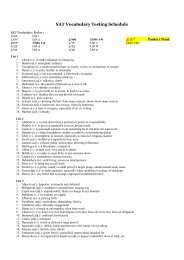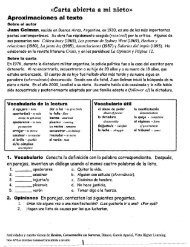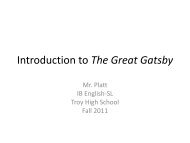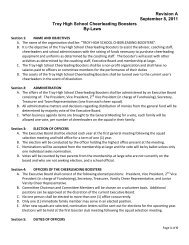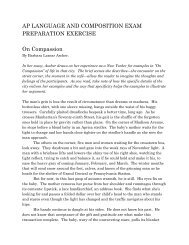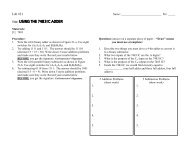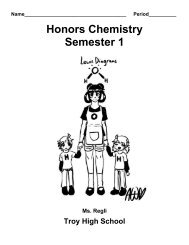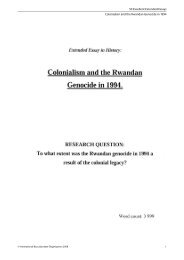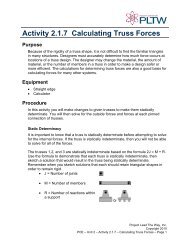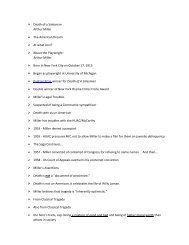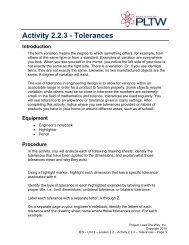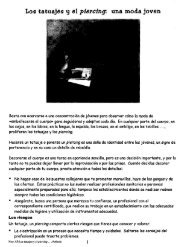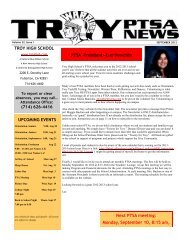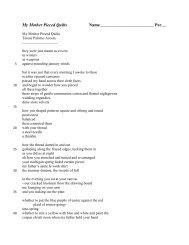MC ORB Assignment Packet - Troy High School
MC ORB Assignment Packet - Troy High School
MC ORB Assignment Packet - Troy High School
Create successful ePaper yourself
Turn your PDF publications into a flip-book with our unique Google optimized e-Paper software.
The Martian Chronicles: outside reading assignment<br />
What’s in this packet<br />
Page 1 <strong>Assignment</strong> overview<br />
Page 2 The Martian Chronicles table of contents with page breakdown<br />
Page 3-6 Guiding questions (use these to guide your passage selection in each story)<br />
Page 7-8 Dialectical Journal explanation and sample<br />
<strong>Assignment</strong> overview:<br />
You are to read ray Bradbury’s The Martian Chronicles by Tuesday Nov. 1 st . This is not a novel, but<br />
instead is a collection of short stories that are all thematically connected. There are 13 short stories<br />
and 11 “linking tales”. The linking tales are used for one of the following purposes:<br />
Place description<br />
Plot summary<br />
Description of time passing<br />
Author commentary<br />
Statement of facts<br />
Anticipation of coming events<br />
The dialectical journal that you are assigned for this work only requires that you read the 13 short<br />
stories.<br />
On the following page you will find the table of contents that shows the main short stories, a page<br />
count for each, and the total page count for all 13 stories. You should use this table to help organize<br />
your completion of this assignment.<br />
PLEASE do NOT procrastinate—I know that reading short stories doesn’t seem like much, but reading<br />
and analyzing requires time so use it wisely.<br />
DJ assignment<br />
You are to select at least 1 significant passage from each story to respond to in dialectical format. You<br />
will have at least 13 passages with responses by the time you have finished reading this work.<br />
Format<br />
Follow the format in the sample on page 8. Your DJs are to be typed. You may print 2-3 per<br />
sheet (adjust your font and margins accordingly). If you do NOT have access to a computer<br />
and printer, please let me know asap (before I collect this assignment, long before).
The Martian Chronicles: Table of Contents<br />
Page # Year Title<br />
Total<br />
Pages<br />
Read by…<br />
These opening stories and bridges serve as a prologue (an introduction to) the rest of the book by<br />
providing us with glimpses of life on Mars and showing Earthlings trying to settle it. The stories<br />
and bridges may not directly relate to the rest of the book, but they will give you a sense of what<br />
you can expect from Bradbury’s chronicles.<br />
The main stories are all quite different from one another so don’t be alarmed. They represent the versatile<br />
talents of Bradbury. Use the questions that follow to help guide your understanding of each individual<br />
story as well as the connecting thread amongst the three.<br />
1 January 1999 Rocket Summer 1<br />
2 February<br />
Ylla 12.5<br />
1999<br />
14 August 1999 The Summer Night 2<br />
16 August 1999 The Earth Men 14.5<br />
31 March 2000 The Taxpayer 1<br />
32 April 2000 The Third Expedition 16 3 (43 pages) by Fri. 10/14<br />
These six stories show the settlement of Mars. Bradbury takes us from the first expedition to the<br />
beginning of the war on Earth. One special note should be made for “Way in the Middle of the Air” (page<br />
89). Bradbury wrote this story in the late 1940s, long before the Civil Rights Act. Bradbury’s<br />
characterization of African Americans and the racism to which they were subjected shows just how “ahead<br />
of his time” Bradbury truly was.<br />
48 June 2001 --And the Moon Be Still as 24.5<br />
Bright<br />
73 August 2001 The Settlers .5<br />
73 Dec. 2001 The Green Morning 4.5<br />
78 Feb. 2002 The Locusts .5<br />
79 August 2002 Night Meeting 8<br />
87 Oct. 2002 The Shore .5<br />
87 Feb. 2003 Interim .5<br />
88 April 2003 The Musicians 1.5<br />
89 June 2003 Way in the Middle of the Air 12.5<br />
102 2004-2005 The Naming of Names 1<br />
103 April 2005 Usher II 15 4 (60 pages) by Fri. 10/21<br />
118 Aug. 2005 The Old Ones .5<br />
119 Sep. 2005 The Martian 12.5<br />
In Part III, the war begins and the Earth men desert Mars; unfortunately, they do not leave it as<br />
they found it. In these stories you will see a few characters dealing with isolation, a story with no<br />
characters at all, and finally a story with “Adam” and “Eve” living very much aware of the evil around them.<br />
One special note about “The Silent Towns”: some of you may be irritated and even possibly offended by<br />
this story, but please bear in mind that Bradbury is trying to make a point and he’s trying to use humor to<br />
make that point.<br />
131 Nov. 2005 The Luggage Store 1.5<br />
133 Nov. 2005 The Off Season 11<br />
144 Nov. 2005 The Watchers 1.5<br />
145 Dec. 2005 The Silent Towns 10.5<br />
156 April 2026 The Long Years 10.5<br />
166 Aug. 2026 There Will Comes Soft 6.5 5 (51 pages) by Fri. 10/28<br />
Rains<br />
172 Oct. 2026 The Million Year Picnic 9.5 9 pages by Tues. 11/1<br />
total 163.5<br />
The main short stories are in bold, the others are linking tales.<br />
THIS IS THE ONLY HOMEWORK YOU WILL HAVE OVER THE NEXT THREE WEEKS<br />
SO PLAN ACCORDINGLY.
Guiding questions for ALL sections:<br />
FYI, as you will be writing a response to literature for this novel, you should pay special attention to questions 3 and 4…<br />
1. What social problem, if any is the focus of this<br />
2. What are the major character dynamics you can identify How are the people characterized How do they<br />
interact Motives<br />
3. What is the central theme or message of the story<br />
4. What is the story saying about twentieth-century America (American society)<br />
The Martian Chronicles: Reading Guide Prompts<br />
Below you will find a brief explanation for some of the stories, along with guiding questions. You should read the<br />
questions before starting the chapter to help guide your reading; these should provide you with a focus. You do NOT<br />
have to respond to these questions—I will not be collecting this from you. You should, however, use these to guide you in<br />
selecting a passage for discussion in your DJ.<br />
Rocket Summer<br />
Bradbury knew as well as anyone that no conceivable number of rocket launches could literally change the weather in this<br />
way; this is simply a fantasy, a tone poem evoking enthusiasm for the coming space age.<br />
Ylla<br />
What features of this story make the setting and the characters alien and strange Identify some specific "exotic" touches.<br />
1. What is Martian technology like What features make them seem all too human, even old-fashioned<br />
2. What are the unspoken assumptions about men's and women's roles in this story<br />
3. What kind of relationship does this couple have "Drink to Me Only With Thine Eyes" (See below: “To Celia”) was a<br />
sentimental popular song, old-fashioned even in 1950.<br />
4. If all Martians have last names that consist of a letter of the alphabet, there would seem to be only 26 possible names--<br />
rather restrictive. Can you think of any explanation for this pattern<br />
To Celia<br />
Drink to me, only, with thine<br />
eyes,<br />
And I will pledge with mine;<br />
Or leave a kiss but in the cup<br />
And I'll not look for wine.<br />
The thirst, that from the soul<br />
doth rise<br />
Doth ask a drink divine:<br />
But might I of Jove's nectar<br />
sup,<br />
I would not change for thine.<br />
I sent thee, late, a rosy<br />
wreath,<br />
Not so much honouring thee,<br />
As giving it a hope, that there<br />
It could not withered be.<br />
But thou thereon did'st only<br />
breath,<br />
And sent'st it back to me:<br />
Since when it grows, and<br />
smells, I swear,<br />
Not of itself, but thee.<br />
---Ben Jonson (1573-1637)<br />
The Summer Night<br />
1. How is this linking tale similar in theme to "Ylla"<br />
2. "She Walks in Beauty" was written by Lord Byron in 1815 (see below) as a deliberate contrast to the<br />
tradition praising only "fair" (that is, blonde, light-skinned) women as beautiful. What qualities in the<br />
four lines quoted make it appropriate for its use here<br />
3. Is the Martian ability to read thoughts an advantage or a disadvantage<br />
4. Identify and discuss a familiar process that takes place among human beings for which this story<br />
could be read as a metaphor.<br />
She Walks In Beauty<br />
She walks in beauty, like the<br />
night<br />
Of cloudless climes and starry<br />
skies;<br />
And all that's best of dark and<br />
bright<br />
Meet in her aspect and her<br />
eyes:<br />
Thus mellow'd to that tender<br />
light<br />
Which heaven to gaudy day<br />
denies.<br />
One shade more, one ray less,<br />
Had half impair'd the<br />
nameless grace<br />
Which waves in every raven<br />
tress,<br />
Or softly lightens o'er her<br />
face;<br />
Where thoughts serenely<br />
sweet express<br />
How pure, how dear their<br />
dwelling place.<br />
And on that cheek, and o'er<br />
that brow<br />
So soft, so calm, yet eloquent,<br />
The smiles that win, the tints<br />
that glow,<br />
But tell of days in goodness<br />
spent,<br />
A mind at peace with all<br />
below,<br />
A heart whose love is<br />
innocent!<br />
---Lord Byron (1788-1824<br />
The Earth Men<br />
1. How is Bradbury working against the standard expectations of a "first contact" story<br />
2. Belief in telepathy (direct mind-to-mind communication of thoughts) has little or no scientific basis,<br />
but it is a staple of science fiction because it makes possible interesting plots and because as here it
solves the knotty problem of how alien races can communicate with each other. What prevents the<br />
Martians from realizing that the men are really from Earth<br />
3. Why might people who believe in "flying saucers" and other alien contacts like this story<br />
4. In the previous stories the Martians had no problem in perceiving that the thoughts invading their<br />
minds were alien; can you come up with any explanation for why they might now view the earth<br />
people as manifestations of their own minds<br />
The Third Expedition<br />
1. Bradbury nostalgically evokes his early 20th-century Midwestern small-town upbringing in many<br />
stories, notably those collected in Dandelion Wine. Yet for all its sentimental appeal, he also<br />
repeatedly uses the setting for the evocation of nightmares. Here he portrays an America, which by<br />
1950 was already vanishing and would be quite unlike the background familiar to any probable<br />
astronaut young enough to be sent to Mars in the year 2000. Because we are reading this story long<br />
after it was written, this incongruity strikes us more forcefully than it would have struck those who<br />
first read it, for they shared Bradbury's nostalgic memory. How does he rationalize his use of this<br />
setting<br />
2. The music mentioned was popular during the first two decades of this century. When this story was<br />
first published, it was titled "Mars is Heaven." Explain this title.<br />
3. The Martians in "The Earth Men" seem to have acted out of confusion rather than malice. Is this true<br />
of the Martians in this story What do you think their motives are Why might those motives have<br />
developed since the time of the earlier story<br />
And the Moon Be Still as Bright<br />
1. The title comes from the Lord Byron poem, "So We'll Go No More A-Roving" (1817—see below) which<br />
is usually read as a meditation on the inevitability of death. What might its meaning be in this story<br />
2. This story seems modeled on World War II movies about a small troop of men from various ethnic<br />
backgrounds faced with a dangerous environment. The token minority figure here is a Native<br />
American named "Cheroke." In the TV version, one character was made into an African-American<br />
instead; but why is Bradbury's choice especially appropriate for this story<br />
3. To what historic event does the death of the Martians correspond<br />
4. The crew seems much like that of a traditional adventure novel: rough, ill-educated sailors, very<br />
unlike the astronauts of our day. Aside from the question of realism, why might Bradbury have<br />
wanted to use a group of "average guys" as his explorers<br />
5. What is the point of Spender's speech about the tendency of Earth Men to rename everything (This<br />
theme is continued later in the story "The Naming of Names.")<br />
6. What critique does Spender make of American civilization as regards art in his final conversation with<br />
the captain<br />
7. What does Spender see as the two cultural forces that clashed on Earth but which the Martians<br />
succeeded in blending<br />
8. How did Martians answer the question, "What is the meaning of life" according to Spender<br />
9. In 1950, tape recording on reels was brand-new cutting-edge technology (brought back from<br />
conquered Germany by GIs), so Bradbury has the Martians record their music in this futuristic<br />
fashion. What is the significance of the captain's meditations on majority rule while he is hunting<br />
down Spender<br />
10. What is the attitude of this story toward democracy<br />
We'll Go No More A-<br />
roving<br />
So, we'll go no more a-<br />
roving<br />
So late into the night,<br />
Though the heart be still as<br />
loving,<br />
And the moon be still as<br />
bright.<br />
For the sword outwears its<br />
sheath,<br />
And the soul wears out the<br />
breast,<br />
And the heart must pause to<br />
breathe,<br />
And love itself have rest.<br />
Though the night was made<br />
for loving,<br />
And the day returns too soon,<br />
Yet we'll go no more a-<br />
roving<br />
By the light of the moon.<br />
---Lord Byron (1788-1824)
The Green Morning<br />
Even in 1950, it was known that Mars had little oxygen in its atmosphere. Its reddish hue suggested that at one time<br />
there had been more free oxygen on Mars, which had slowly combined with iron to produce iron oxide. The<br />
standard science fictional Mars was an exhausted planet whose ancient civilization if any would have died with the<br />
atmosphere. Humans could live there only in sealed environments or by "terraforming" the planet to render its<br />
atmosphere more breathable: a project recently explored in the novels Red Mars and Green Mars by Kim Stanley<br />
Robinson. Bradbury characteristically ignores scientific plausibility here to create a poetic image loosely related to<br />
such projects.<br />
1. What makes this account different from such a scientific project<br />
The Locusts<br />
What significance do the similes used of the rockets have<br />
Night Meeting<br />
One of the favorite SF themes with only very slim scientific justification is time travel. No rationale is offered here<br />
for communication between eras: Mars is magic. But it's pointless to criticize Bradbury too much for this fact: very<br />
few time-travel stories even by the most rigorously scientific authors cannot be reduced to self-contradiction by a<br />
little elementary logic.<br />
1. What is the emotional impact of this encounter between two eras<br />
2. What indication is there in this story that when it was written Bradbury was not thinking of a Mars covered by<br />
the trees described in "The Green Morning"<br />
3. Is there a message in this story<br />
4. What does the closing paragraph convey about the nature of life and time<br />
The Musicians<br />
Bradbury gives no rationale for this determined obliteration of the Martian cities, much more thorough and<br />
deliberate than anything ever attempted in the history of Earthly colonialism. It is here that he first introduces the<br />
concept of "Firemen" who light fires rather than putting them out, a concept developed more fully in his novel<br />
Fahrenheit 451.<br />
1. What seems to be his attitude toward humanity here<br />
Way in the Middle of the Air<br />
This story seems very dated--even condescending--now: but it was written during the first stirrings of the post-<br />
World War II civil rights movement, and was outspoken for its time in its attack on Southern lynching, segregation<br />
and racism generally.<br />
1. What would be the significance of naming a rocket "Over Jordan"<br />
2. To what Biblical events one past, one future is this escape from Earth compared<br />
3. Note that although in "The Shore" it is implied that only Americans can afford rockets, they are here available to<br />
poor people. These stories do not all exist in exactly the same fictional universe. Is human nature portrayed any<br />
differently in this story than in the stories immediately preceding it<br />
4. There is a sequel to this story called "The Other Foot" in The Illustrated Man, in which the African-American<br />
immigrants to Mars have to decide whether to take their revenge on the whites who follow them into exile,<br />
making up a new minority group.<br />
The Naming of Names<br />
The theme of this story is more fully developed in "The Exiles" from The Illustrated Man.<br />
1. What quality of the later immigrants to Mars serves to introduce the next story<br />
Usher II<br />
This story was omitted from the television version, probably partly because it would have been too expensive to<br />
produce; but also because it has no necessary connection with the other stories. It might just as well have been set<br />
on Earth as Mars. It reflects the Bradburian affection for fantasy and horror literature combined. The attack on<br />
censorship which it embodies (foreshadowing the more fully-developed attack of Fahrenheit 451) is justified by<br />
reference to fairy tales and other sentimental children's favorites; but the works being defended most passionately<br />
are the horror tales of Edgar Allan Poe.<br />
1. Why do you think he includes the other seemingly unrelated, non-horror works<br />
2. Many works by Poe are referred to in this story. How many can you identify<br />
3. What movement active in 1950 seems to have inspired this attack on censorship (Hint: Stendhal refers to it in<br />
his conversation with Bigelow.)
4. The mentions of a number of characters from Oz will be unfamiliar to those unfortunate enough to know that<br />
land only from the Hollywood movie and who have not read the long series of novels by L. Frank Baum. What is<br />
a Babbit (Look it up.)<br />
5. Does this story successfully convey an anti-censorship message Why or why not<br />
The Martian<br />
From this point on, having seemingly exterminated the Martians, Bradbury brings them back again and again in<br />
various forms. Rather than view this as a damaging inconsistency it makes more sense to read these stories as<br />
variations on a theme.<br />
1. What human characteristics is Bradbury commenting on in this story<br />
The Luggage Store<br />
This story seems wildly implausible now, but it was modeled on the flight of émigré s from Europe back to the U.S.<br />
at the beginning of each of the great World Wars; and would have seemed familiar to readers in 1950.<br />
1. What motivates the immigrants to return to Earth<br />
The Off Season<br />
Visions of atomic apocalypse were published in some numbers in the years immediately following the bombing of<br />
Hiroshima and Nagasaki. Even though in 1948 the Soviet Union was far from posing any serious nuclear threat,<br />
Bradbury's story reflects the fears of many that humanity had entered an era of unprecedented danger.<br />
1. In which earlier story did Sam Parkhill play a role<br />
2. Is his behavior here consistent with that in the earlier story Explain.<br />
3. How does this story compare with the traditional battle-with-aliens-for-survival story<br />
4. The description of the death of Earth is even more fantastic than the collapse of an entire city from the impact<br />
of a single bullet earlier in the story. Why do you think Bradbury uses such exaggerated language<br />
5. What would a real nuclear war probably look like from Mars<br />
The Silent Towns<br />
Bradbury wrote a variation on this story entitled "Night Call, Collect," published in I Sing the Body Electric. This<br />
story is probably the most stereotypically “sexy” in the book.<br />
1. What do you think its message is<br />
The Long Years<br />
This story celebrates love, marriage, and other traditional family values.<br />
1. Does it make you feel better about the human race<br />
There Will Come Soft Rains<br />
This story was partly inspired by the silhouettes of people burned by the bomb onto buildings and streets in<br />
Hiroshima. Like "Usher II," there is no obvious reason for it to be included in a volume of stories set on Mars, and<br />
was omitted from the television miniseries. It is an unusual story in that it has no living human beings in it.<br />
1. How does Bradbury manage to tell the family's story anyway<br />
The Million-Year Picnic<br />
This was the first of the Martian Chronicles stories to be written, shortly after the end of World War II. It was first<br />
published in Planet Stories in the summer of 1946.<br />
1. Does the story make you feel hopeful for the survival of the human race<br />
2. What measures does the father take to try to ensure for his children a better future<br />
3. Do any of these measures conflict with values expressed earlier in The Martian Chronicles<br />
4. Many people who have read and loved The Martian Chronicles forget entirely that the Earth is destroyed in a<br />
nuclear holocaust during the course of the book and are surprised to be reminded of the fact. Why do you<br />
suppose this is true
Dialectical Journal<br />
What is a “dialectical journal”<br />
A dialectical journal is a running “dialogue” between you, the reader, and what you are reading.<br />
This is done by recording notes in the form of quotations or paraphrases and then interpreting<br />
what you have recorded, thus demonstrating a critical understanding of the text.<br />
This sort of journal is especially useful for literary response assignments ☺<br />
How do I organize this journal<br />
A dialectical journal takes the form of a double entry notation, with the quotation/passage<br />
located on the left side of the page and your reaction on the right side.<br />
Sentence, line, phrase, or<br />
paraphrase that:<br />
1. May remind you of<br />
something; make you<br />
think or question<br />
2. May reveal insight<br />
about theme,<br />
character<br />
development, etc.<br />
3. May be an example of<br />
pleasing or disturbing<br />
writing style<br />
Response/commentary options:<br />
1. Making a Connection: to personal<br />
experiences, life, other literature, etc.<br />
2. Interpret/Evaluate: Determine the<br />
meaning of what you’ve read; Form<br />
opinions both while you’re reading<br />
and after you’ve finished. Develop<br />
your own judgments about the<br />
characters and your own ideas about<br />
events.<br />
3. Extend the meaning: what does the<br />
quote say about all people and<br />
humanity<br />
4. Challenging the text: forming<br />
questions about the validity of<br />
implied/explicit connections or<br />
claims, reliability of narrator,<br />
development of plot, character, style,<br />
etc.<br />
Grading criteria<br />
An A (excellence) journal will do all of the following:<br />
Selects detailed and meaningful passages<br />
Insightful interpretation and commentary about the text; avoids clichés and<br />
summary<br />
Includes comments about literary elements such as diction, imagery, syntax, and<br />
how these elements contribute to the meaning of the text.<br />
Makes insightful personal connections and asks thought-provoking, insightful<br />
questions<br />
Coverage of text is complete and thorough<br />
Journal is neat and organized; student has followed directions in the organization<br />
of journal
Sample dialectical journal<br />
Notice how this student doesn’t solely focus on the quote itself. This student has used the quote<br />
as a springboard for a discussion on various elements found up to that point in the novel.<br />
This student chose to incorporate a discussion of certain literary elements, which is always a<br />
viable option, but not always be applicable.<br />
Keep in mind that your goal is to interpret the meaning beyond the text, don’t get caught up<br />
in observations or is simple summary. Whatever you do, do NOT summarize the events<br />
depicted in the passages you select; I’ve read the book, I know what happens. What I don’t know<br />
is what YOU think it all means…<br />
“Title of short story”<br />
“With hands locked together, invisible among<br />
the press of bodies, they stared steadily in front<br />
of them, and instead of the eyes of the girl, the<br />
eyes of the aged prisoner gazed mournfully at<br />
Winston out of nests of air” (97).<br />
George Orwell, 1984*<br />
SAMPLE FORMAT FOR<br />
HARD COPY (PRINT OUT)<br />
DEADLINES ONLY<br />
Response<br />
This quote reveals the deplorable state of<br />
Winston’s situation through the use of<br />
symbolism and comparison. Firstly, the quote<br />
describes Winston and the dark-haired girl as<br />
invisible, indicating that their shared defiance<br />
of the Party and their unmistakable rebellious<br />
behavior is futile, and both they and their<br />
actions are meaningless. The depiction reduces<br />
them to virtual worthlessness, and one is able<br />
grasp the senselessness of their exploits. In<br />
addition, Orwell employs a symbolic, indirect<br />
metaphor to compare the eyes of the girl with<br />
those of the aged prisoner. Even though<br />
Winston is experiencing the closest thing to<br />
“love” that he has felt in a long time, it is ironic<br />
that he still does not know the color of the eyes<br />
of the girl. Even though they share this brief<br />
moment of compassion with each other,<br />
demonstrated through the holding of the<br />
hands, they do not look at each other, and<br />
instead Winston is forced to look upon the<br />
prisoners that are passing through. By<br />
comparing the girl’s eyes with that of the<br />
prisoner, Orwell is able to hint at a possible<br />
foreshadowing and to make the implication<br />
that Winston’s relationship with the darkhaired<br />
girl could ultimately lead to their<br />
arrests, and then to their deaths. The fact that<br />
Winston is establishing this bond between<br />
himself and the prisoner through the prolonged<br />
eye contact illustrates the fact that Winston<br />
himself is not far from being in the other man’s<br />
position, as he himself is also technically an<br />
enemy of the Party now as well because of his<br />
traitorous and disloyal behavior.<br />
-A. Kansari*<br />
*YOU do not have to include the title of the book or you name after each entry…
Jane Doe<br />
English 2 AP, period 1<br />
Link<br />
16 October 2011<br />
SAMPLE FORMAT FOR<br />
TURNITIN.COM DEADLINES<br />
YOUR PAPER SHOULD LOOK<br />
EXACTLY LIKE THIS…<br />
DJ Entries: Part 1<br />
“Ylla”<br />
“With hands locked together, invisible among the press of bodies, they stared steadily in front of them,<br />
and instead of the eyes of the girl, the eyes of the aged prisoner gazed mournfully at Winston out of nests<br />
of air” (97).<br />
Response:<br />
This quote reveals the deplorable state of Winston’s situation through the use of symbolism and<br />
comparison. Firstly, the quote describes Winston and the dark-haired girl as invisible, indicating that their<br />
shared defiance of the Party and their unmistakable rebellious behavior is futile, and both they and their<br />
actions are meaningless. The depiction reduces them to virtual worthlessness, and one is able grasp the<br />
senselessness of their exploits. In addition, Orwell employs a symbolic, indirect metaphor to compare the<br />
eyes of the girl with those of the aged prisoner. Even though Winston is experiencing the closest thing to<br />
“love” that he has felt in a long time, it is ironic that he still does not know the color of the eyes of the<br />
girl. Even though they share this brief moment of compassion with each other, demonstrated through the<br />
holding of the hands, they do not look at each other, and instead Winston is forced to look upon the<br />
prisoners that are passing through. By comparing the girl’s eyes with that of the prisoner, Orwell is able to<br />
hint at a possible foreshadowing and to make the implication that Winston’s relationship with the darkhaired<br />
girl could ultimately lead to their arrests, and then to their deaths. The fact that Winston is<br />
establishing this bond between himself and the prisoner through the prolonged eye contact illustrates the<br />
fact that Winston himself is not far from being in the other man’s position, as he himself is also<br />
technically an enemy of the Party now as well because of his traitorous and disloyal behavior.<br />
“The Earth Men”<br />
Passage (#).<br />
Response:<br />
Your response goes here<br />
“The Third Expedition”<br />
Passage (#).<br />
Response:<br />
Your response goes here



